Top 10 Decentralised Social Media Platforms



Editorial Note: While we adhere to strict Editorial Integrity, this post may contain references to products from our partners. Here's an explanation for How We Make Money. None of the data and information on this webpage constitutes investment advice according to our Disclaimer.
Top 10 decentralised social media platforms:
Lens Protocol. Decentralized ecosystem for content creation.
Mastodon. Microblogging for niche communities.
Steemit. Blogging platform with tokenized rewards.
Gab Social. Free speech-focused social network.
Mirror Platform. Blockchain-based publishing and crowdfunding.
Minds. Privacy-focused platform with monetization options.
Aether. Temporary forums with community moderation.
Bluesky. Interoperable network built on the AT Protocol.
Diaspora. Privacy-driven customizable social networking.
Damus. Encrypted microblogging via Nostr protocol.
The digital landscape is evolving, and decentralised social media platforms are at the forefront of this transformation. These platforms prioritize user privacy, freedom of expression, and data ownership — a stark contrast to traditional, centralised social networks. In this article, we explore the top 10 decentralised social media platforms, how they work, and what you need to consider as a user. Do go through the entire list, as we’ll also discuss how some of these platforms offer crypto earning opportunities.
Top 10 decentralised social media platforms
Let’s directly get into the list of the best decentralized social networks. We evaluated these platforms based on their user base, features, security, innovation, and community engagement.
| Platform | Blockchain/Protocol | Focus | Pros | Cons |
|---|---|---|---|---|
| Lens Protocol | Polygon | Content creation & interoperability | Interoperable, strong creator support. | Limited adoption, technical entry barriers. |
| Mastodon | Federated (None) | Microblogging | Community-centric, no blockchain needed. | Fragmented servers, limited monetization. |
| Steemit | Steem | Blogging & monetization | Great for creators, established user base. | Token volatility, less mainstream reach. |
| Gab Social | Custom Protocol | Free speech & community building | Free speech focus, independent control. | Polarizing reputation, no blockchain features. |
| Mirror Platform | Ethereum | Publishing & crowdfunding | Ideal for writers, strong blockchain support. | Requires Ethereum wallet, niche audience. |
| Minds | Ethereum (Hybrid) | Free speech & monetization | User-friendly, monetization opportunities. | Limited scalability, hybrid system complexity. |
| Aether | Custom Protocol | Temporary forums & discussions | Strong community focus, temporary content reduces clutter. | Smaller user base, limited permanence for posts. |
| Bluesky | AT Protocol | Interoperability & scalability | Promising scalability, experienced developers. | Beta access only, underdeveloped ecosystem. |
| Diaspora | Federated (None) | Privacy-focused networking | Strong privacy, highly customizable. | Small user base, lacks blockchain integration. |
| Damus | Nostr Protocol | Encrypted communication | Privacy-centric, secure platform. | Early-stage adoption, requires Nostr knowledge. |
Lens Protocol
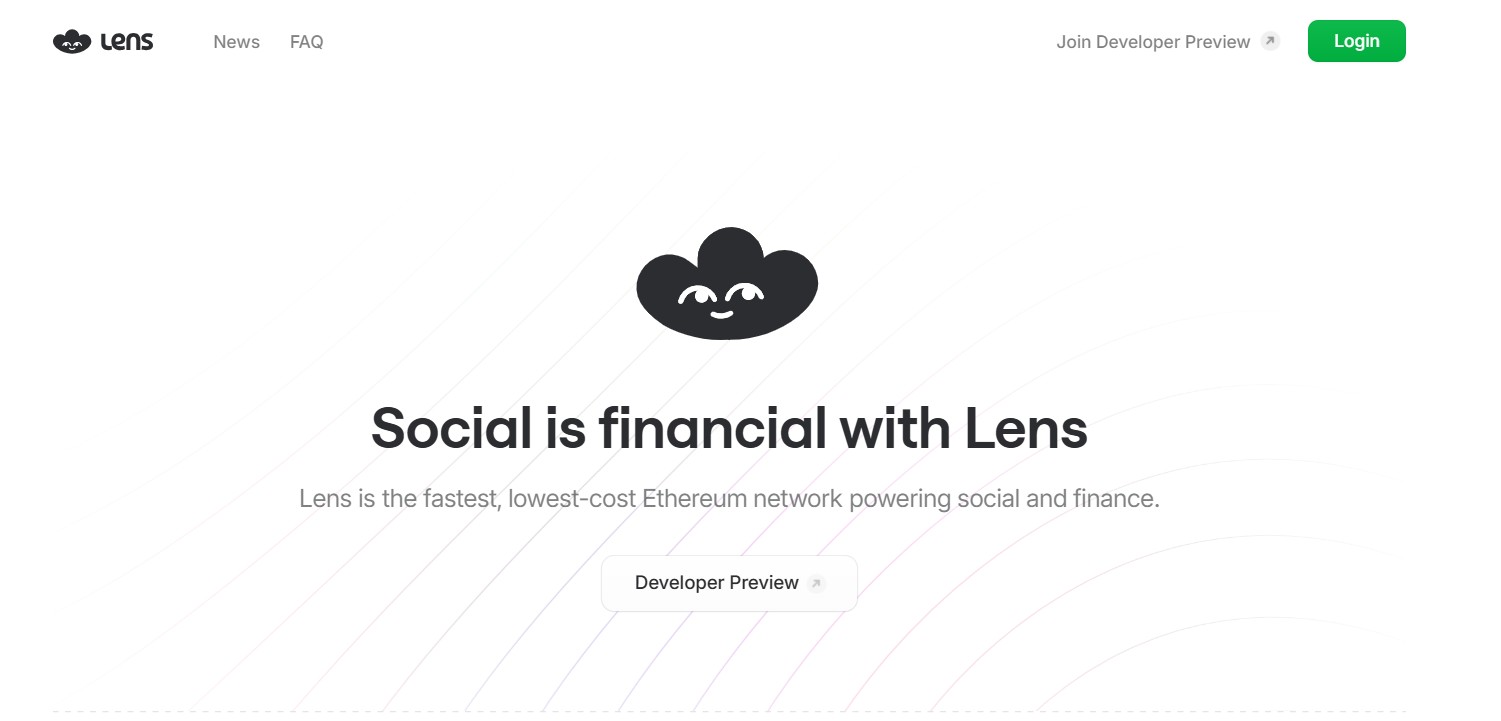
Lens Protocol is a blockchain-based social media platform built on the Polygon network. It creates an interoperable ecosystem for content creators, enabling users to fully own their data while offering numerous monetization opportunities. Users can tokenize their engagement, allowing creators to earn directly through decentralized applications (dApps) integrated into the Lens ecosystem. NFT-based profiles offer additional utility, allowing users to carry their identity across platforms.
- Pros
- Cons
- Highly interoperable with various Web3 platforms.
- Robust ecosystem supporting content creators and developers.
- Limited adoption due to its relatively new entry into the market.
- The technical entry barrier can be high for non-crypto-savvy users.
Getting started: To begin using Lens Protocol, users must create a compatible wallet such as MetaMask. Once the wallet is set up, they can mint their NFT-based profile and start exploring applications like Lenster — a decentralized social media app built on Lens.
Mastodon
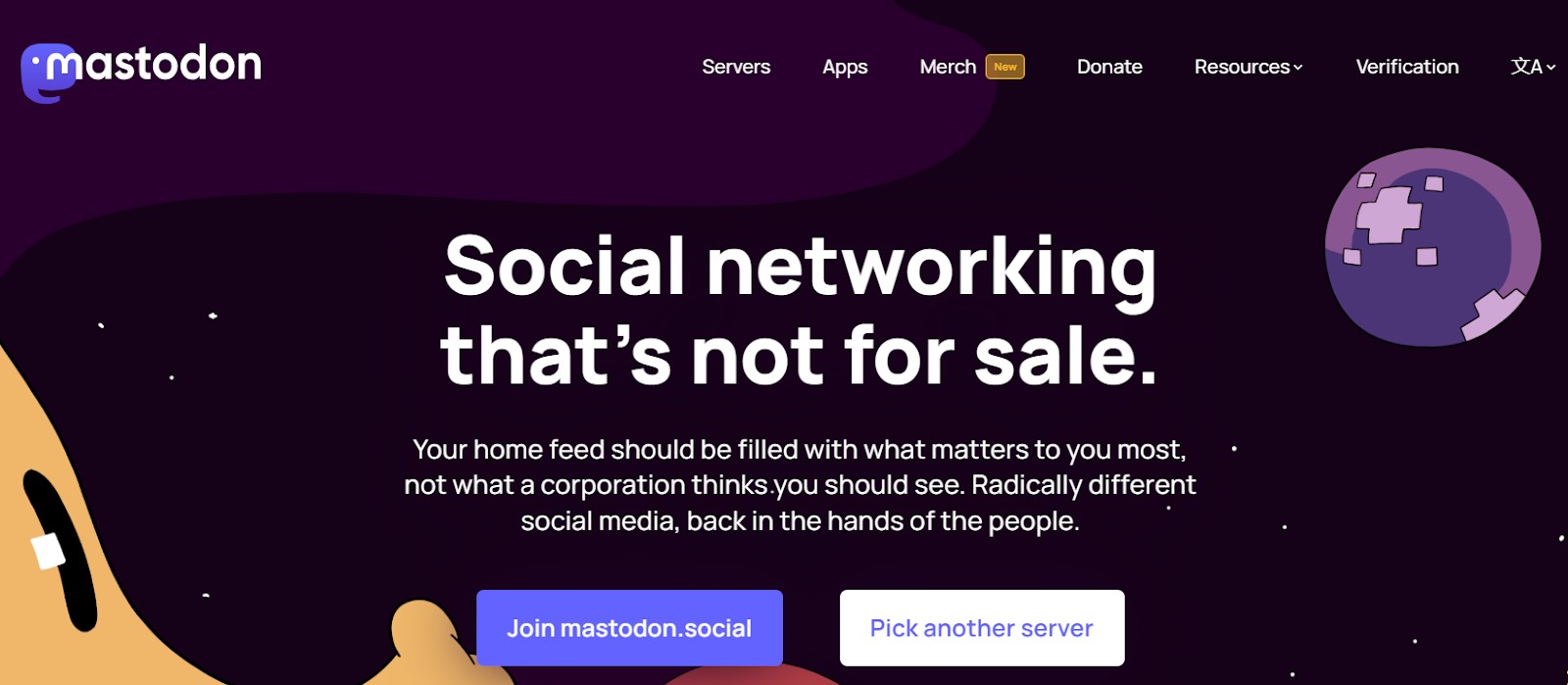
Mastodon is a community-based social media network that allows users to join different servers (called "instances") based on their interests or communities. Unlike blockchain-based platforms, Mastodon operates on an open-source protocol, ensuring a decentralized yet straightforward experience. Its focus on privacy and community control has made it a popular alternative to mainstream platforms. Each instance can set its moderation rules, providing flexibility and customization for users.
- Pros
- Cons
- Great for fostering niche communities and meaningful interactions.
- Does not require blockchain knowledge or cryptocurrency.
- Fragmentation across servers can make user discovery challenging.
- Interface and user experience are less streamlined compared to traditional platforms like Twitter.
Getting started: Users can browse Mastodon's directory of instances and select one that aligns with their interests. After joining, they can set up a profile, post content, and engage with others on the platform.
Steemit
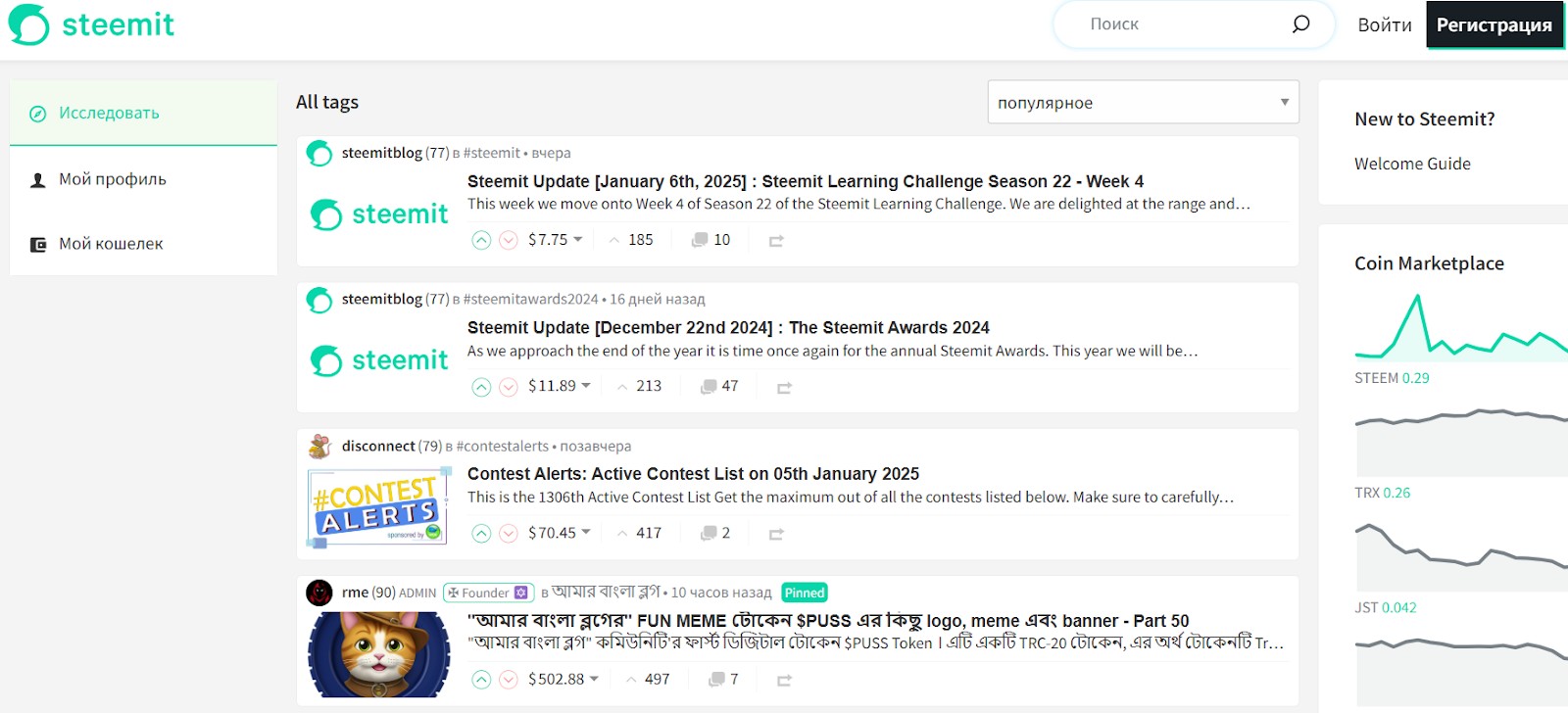
Steemit is one of the earliest decentralized social media platforms, built on the Steem blockchain. It focuses on blogging and content creation, allowing users to earn cryptocurrency rewards for their posts and engagement. Users can publish content and receive upvotes, which translate into STEEM tokens — providing a transparent and rewarding ecosystem for creators. The platform also features vibrant communities known as "tribes," where users can connect with like-minded individuals.
- Pros
- Cons
- Excellent for content creators seeking monetization opportunities.
- Established user base and active communities.
- Reliance on the token’s value introduces volatility in earnings.
- Less reach and visibility compared to mainstream platforms like Medium.
Getting started: Becoming a member on Steemit involves creating an account, which requires minimal blockchain knowledge. Users can then begin blogging and earning tokens based on their content’s reception.
Gab Social
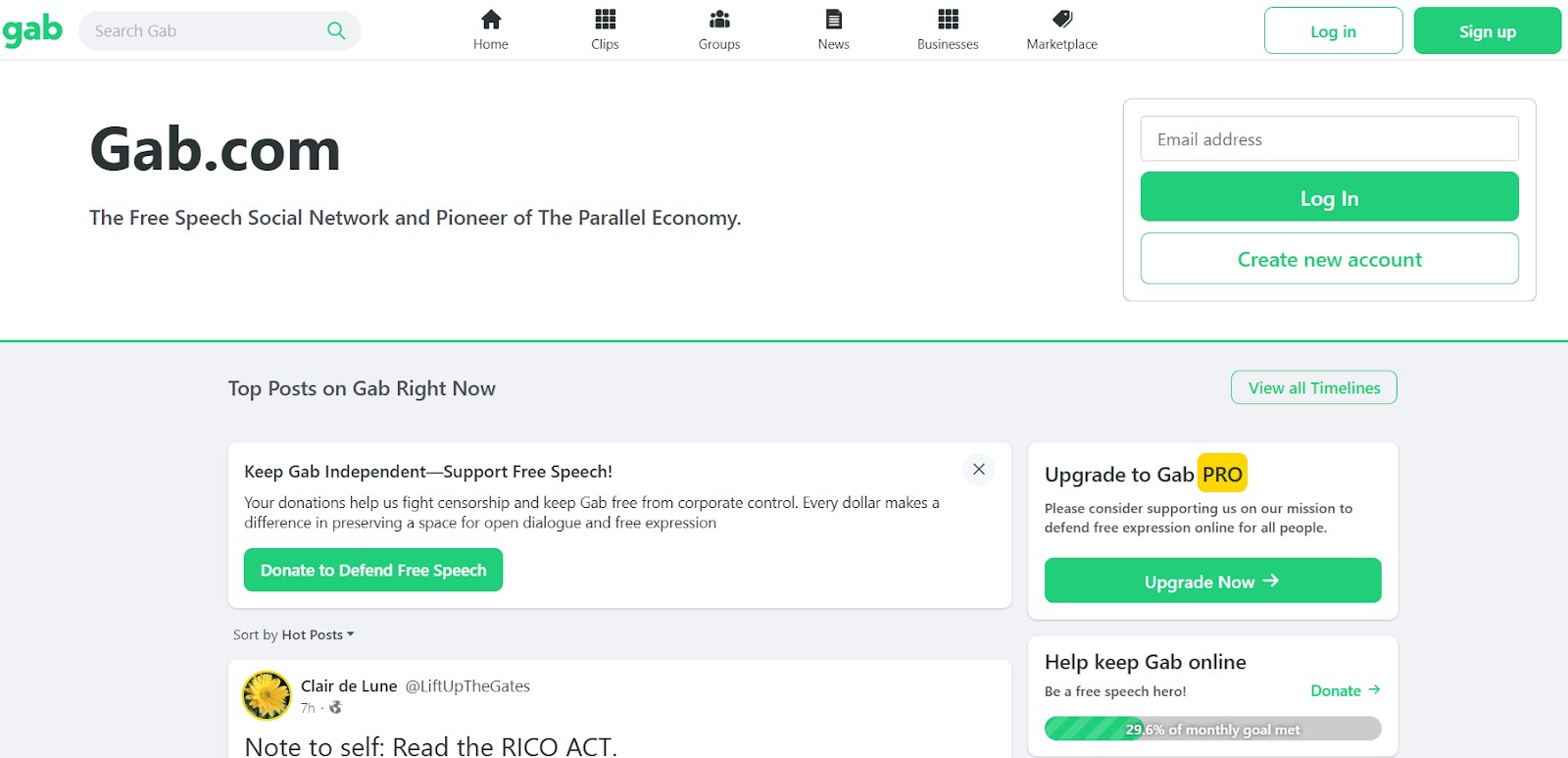
Gab Social is a decentralized platform known for its strong emphasis on free speech. While it does not use blockchain, Gab offers a self-hosted solution, allowing users to set up their communities independently. Gab provides robust moderation tools for community administrators while ensuring freedom from corporate control. It is popular among those who prioritize independent content and privacy.
- Pros
- Cons
- Strong commitment to free speech and independence.
- Established user base with active engagement.
- Polarizing reputation limits mainstream appeal.
- Lack of blockchain integration misses out on tokenized monetization opportunities.
Getting started: Users can register on the Gab Social platform, customize their profiles, and start engaging with content or hosting their communities.
Mirror Platform
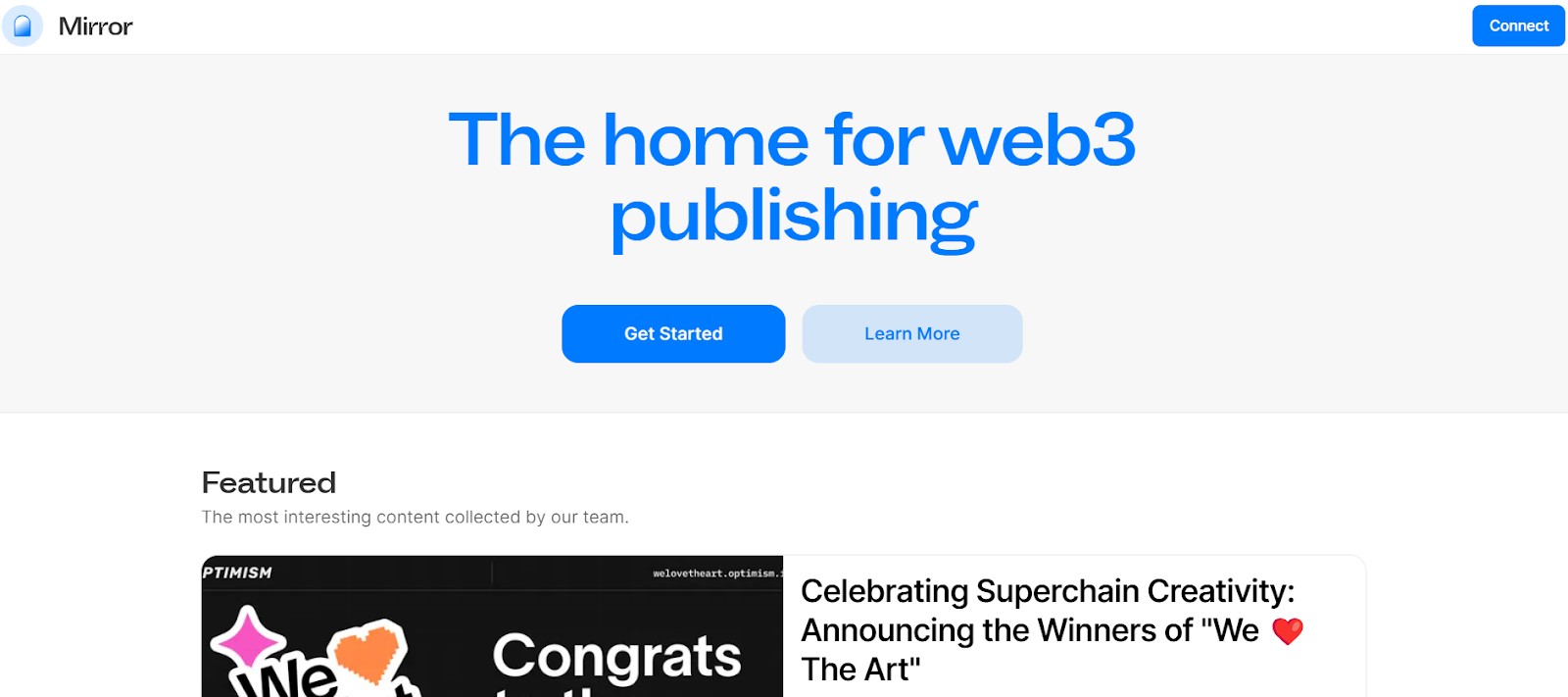
Mirror is a decentralized publishing platform that leverages blockchain technology to empower writers and publishers. Built on the Ethereum blockchain, Mirror combines content creation with crowdfunding and NFT integrations. Writers can tokenize their work, enabling direct monetization through NFTs or crowdfunding campaigns. The platform’s transparency and security make it an appealing choice for modern content creators.
- Pros
- Cons
- Ideal for writers and publishers seeking innovative monetization.
- Strong integration with blockchain technology.
- Requires users to set up an Ethereum wallet, which may deter non-technical audiences.
- Niche user base limits exposure.
Getting started: Users must connect their Ethereum wallet to the Mirror platform, where they can publish content, create NFTs, or initiate crowdfunding campaigns.
Minds
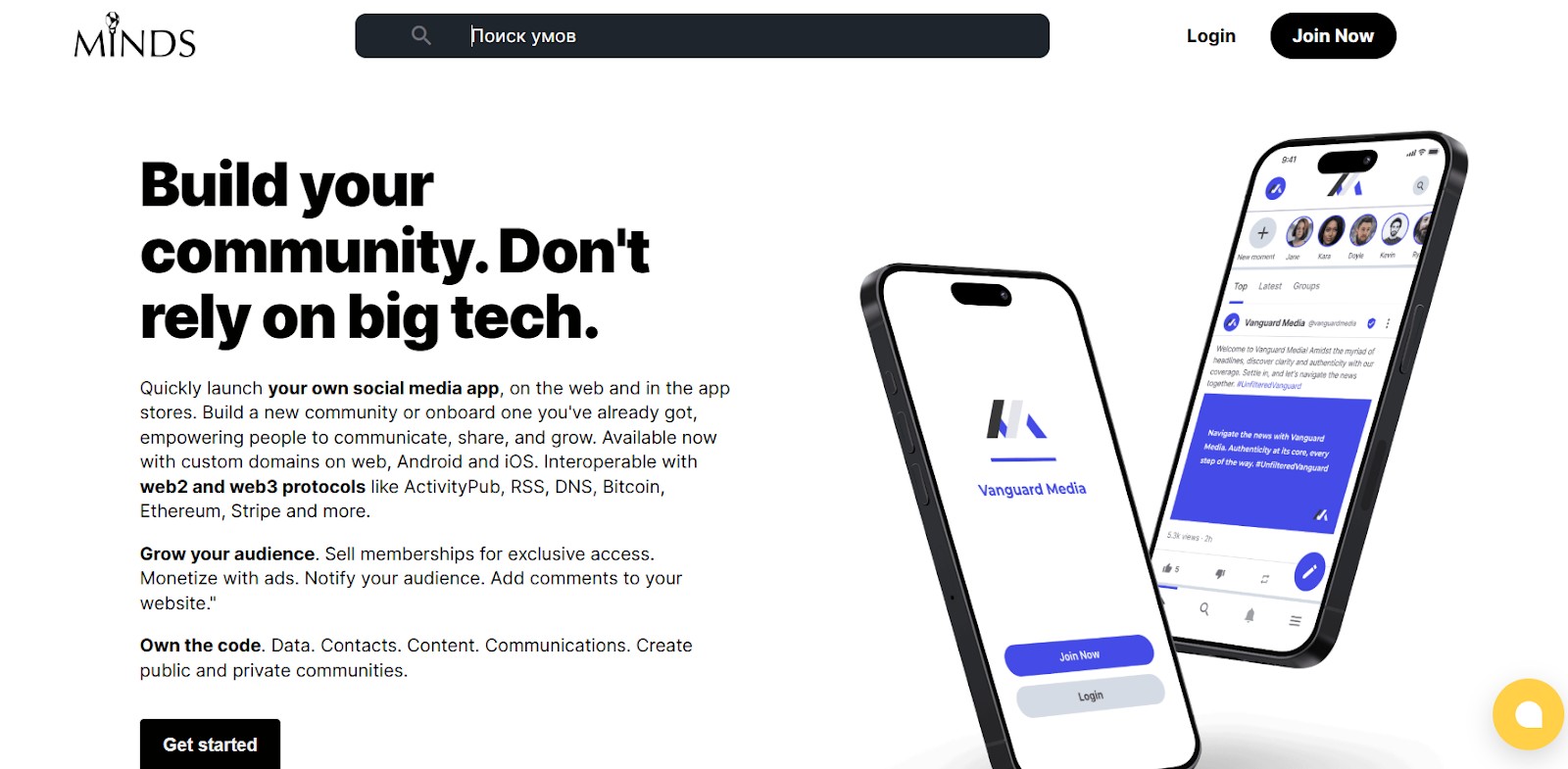
Minds is a hybrid decentralized social media platform that prioritizes free speech and user privacy. Operating partially on blockchain technology, Minds provides users with an opportunity to earn cryptocurrency for their contributions, such as posting content, commenting, or sharing. It also allows users to promote their posts using tokens or earn revenue through ad-sharing. Minds is particularly appealing to content creators looking for monetization options without the need for heavy blockchain knowledge.
- Pros
- Cons
- Straightforward user experience with monetization options.
- Strong focus on privacy and free speech.
- Limited scalability compared to larger centralized platforms.
- Hybrid structure may confuse users unfamiliar with Web3 features.
Getting started: Sign up for Minds with an email or anonymous account. Explore the platform, start earning tokens through engagement, and boost posts to expand your reach.
Aether

Aether is a decentralized platform designed for temporary forums and discussions. It provides a unique approach by allowing users to engage in meaningful conversations without the permanence of traditional social media platforms. Posts on Aether are temporary and disappear after a set period unless community moderators decide otherwise, fostering an environment focused on relevance and reducing long-term clutter. This feature is particularly attractive for users who prefer low-pressure, temporary interactions.
- Pros
- Cons
- Strong emphasis on community moderation and privacy.
- Temporary content eliminates digital clutter and prioritizes relevance.
- Smaller user base limits engagement opportunities.
- Lack of permanence may not suit users looking for long-term visibility.
Getting started: Download the Aether app. After setting up your profile, you can join or create forums tailored to your interests. Engage in discussions knowing that your contributions won’t leave a permanent digital footprint.
Bluesky
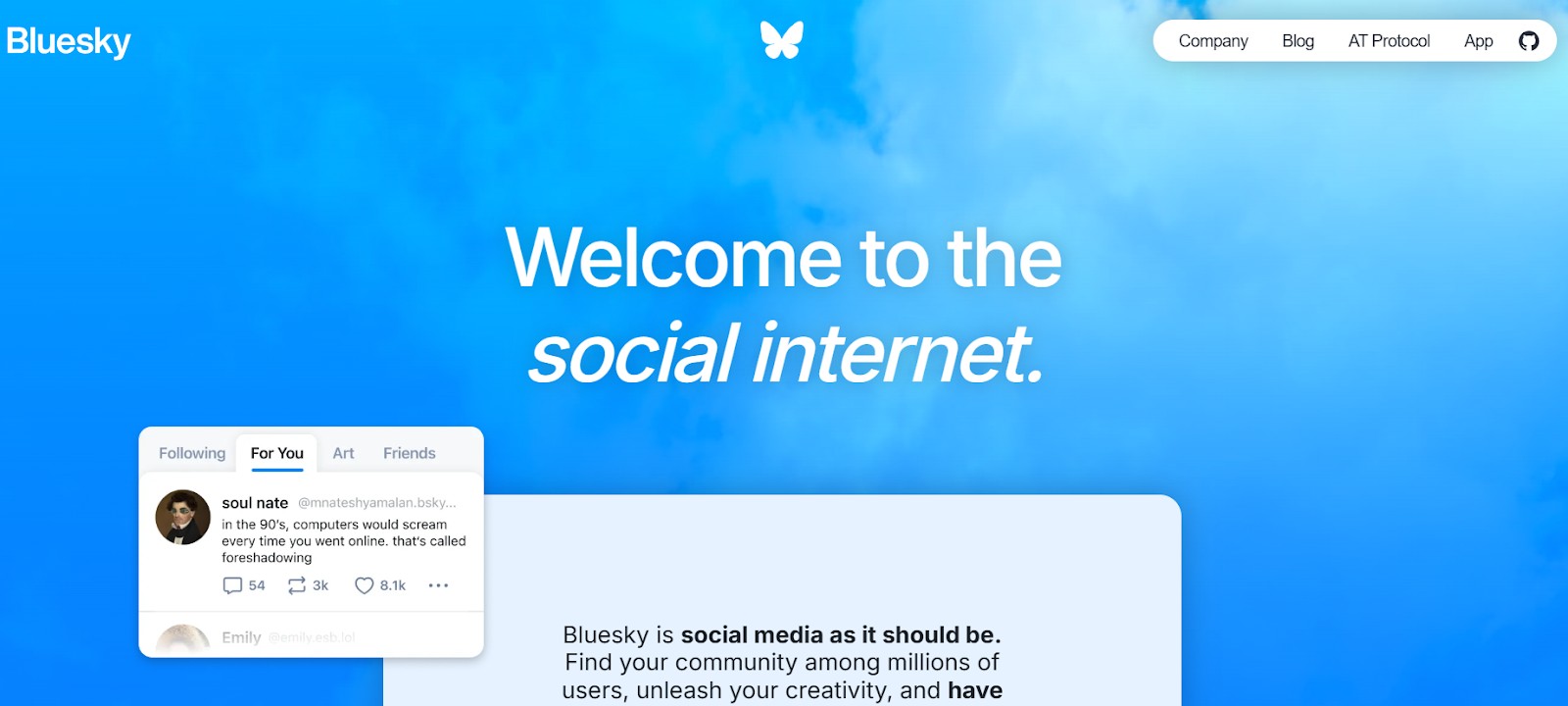
Bluesky is an emerging decentralized social media platform built on the AT Protocol, designed to promote interoperability and scalability. Initially incubated by Twitter, Bluesky aims to provide an open protocol that allows users to seamlessly interact across multiple decentralized networks. Its focus on innovation makes it a promising contender in the Web3 space.
- Pros
- Cons
- Promising scalability with protocol-based interoperability.
- Strong backing from experienced developers in the social media domain.
- Currently in beta, limiting user access and community growth.
- Underdeveloped ecosystem compared to established platforms.
Getting started: Request beta access on the Bluesky website, explore its interface, and provide feedback to help shape the platform’s development.
Diaspora
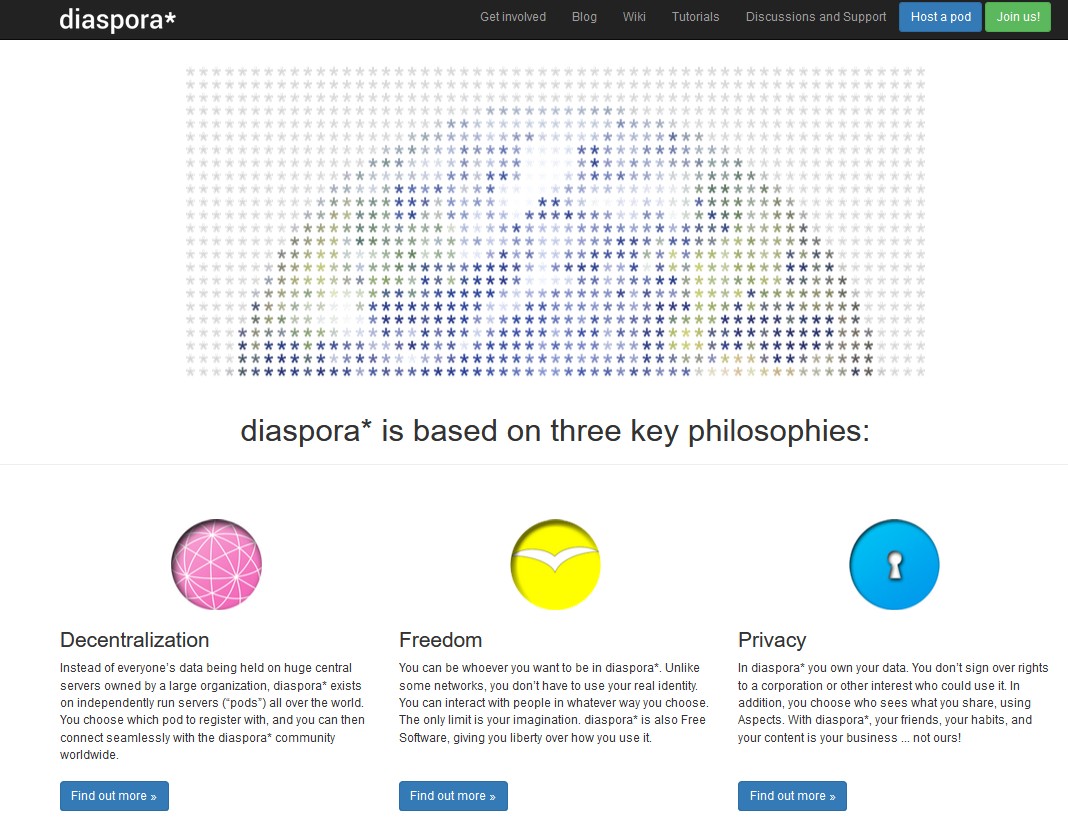
Diaspora is a privacy-focused social networking platform that operates on a community-based protocol rather than blockchain technology. Users can join or create "pods," which are independent servers that host their data, ensuring complete ownership and control. Diaspora is popular among users who prioritize privacy and community engagement without blockchain integration.
- Pros
- Cons
- Strong privacy controls and data ownership.
- Fully customizable pods allow tailored user experiences.
- Smaller user base compared to centralized competitors.
- Lack of blockchain features limits monetization opportunities.
Getting started: Choose a pod from Diaspora’s network, register for an account, and start connecting with friends and communities.
Damus
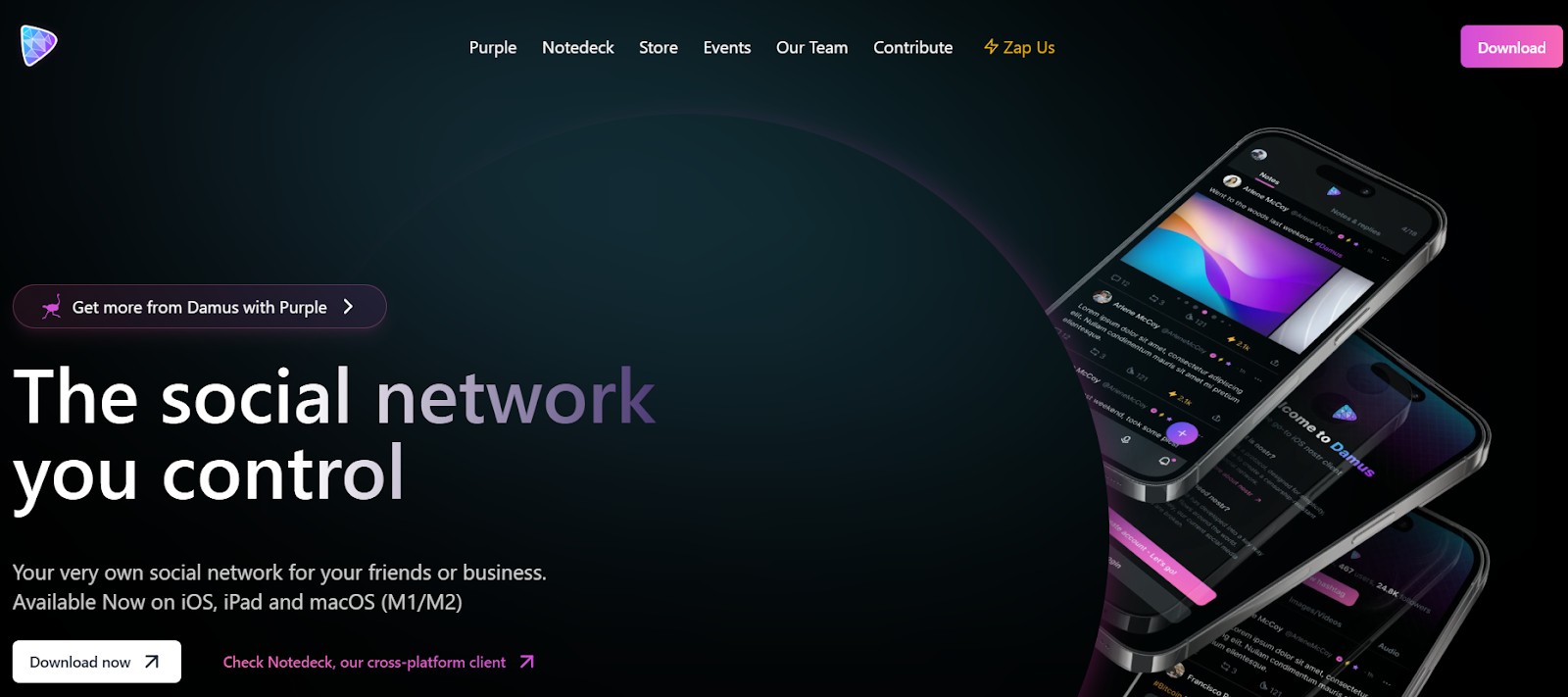
Damus is a decentralized Twitter alternative built on the Nostr protocol, emphasizing encrypted communication and user autonomy. It combines the simplicity of microblogging with the advanced privacy features of decentralization, making it a favorite among security-conscious users.
- Pros
- Cons
- End-to-end encrypted messaging ensures robust privacy.
- Community-driven development encourages innovation.
- Early-stage platform with limited adoption.
- Requires understanding of the Nostr protocol for optimal use.
Getting started: Download the Damus app, set up a profile, and explore its encrypted messaging and microblogging features.
What is decentralised social media?
Decentralised social media platforms operate without a central authority, distributing control across a network of nodes. This design enhances transparency, reduces censorship, and empowers users to own their data. Unlike traditional platforms like Facebook or Twitter, decentralised platforms run on blockchain technology or open-source protocols, enabling user autonomy and innovative monetization models.
Why is decentralised social media important?
As concerns about privacy, censorship, and data exploitation grow, decentralised platforms offer an alternative that prioritises:
User data ownership. Users control their personal data rather than handing it over to corporations.
Censorship resistance. Decentralisation reduces the risk of content suppression.
Monetization opportunities. Tokenized ecosystems allow users to earn rewards for their contributions.
This makes blockchain social media not just a communication tool but also a source of income.
How to withdraw earnings from decentralized social media apps?
For users exploring decentralized social media apps, monetization often involves earning tokens or rewards that can be withdrawn through supported exchanges. Below are some exchanges that support a broad variety of tokens:
| Demo account | Min. Deposit, $ | Spot Taker fee, % | Spot Maker Fee, % | Government-regulated | Investor protection fund | Foundation year | Open an account | |
|---|---|---|---|---|---|---|---|---|
| Yes | 10 | 0,1 | 0,08 | Yes | Yes | 2017 | Open an account Your capital is at risk. |
|
| No | 10 | 0,4 | 0,25 | Yes | No | 2011 | Open an account Your capital is at risk. |
|
| No | 1 | 0,5 | 0,25 | Yes | Yes | 2016 | Open an account Your capital is at risk. |
|
| Yes | 1 | 0,2 | 0,1 | Yes | No | 2018 | Open an account Your capital is at risk. |
|
| No | No | 0 | 0 | No | No | 2004 | Open an account Your capital is at risk. |
What to consider for traders
Ease of use. Start with platforms like Mastodon or Gab Social, which have straightforward interfaces. Some decentralized social media apps make onboarding simple, requiring only a few clicks to get started.
Educational resources. Familiarize yourself with blockchain concepts using tutorials and community forums.
Community support. Join active communities for guidance and troubleshooting.
Customization. Explore platforms like Lens Protocol and Diaspora for advanced user control and integrations.
Monetization. Leverage tokenized rewards on platforms like Steemit and Mirror. Advanced users can capitalize on the earning potential of blockchain social media by engaging actively.
Interoperability. Use protocols like Lens and Bluesky to integrate with other dApps and tools.
Risks and warnings
Technical complexity. Blockchain-based platforms and decentralized networks often require knowledge of wallets and tokens.
Security risks. Protect your private keys and beware of phishing scams.
Adoption barriers. Some platforms face limited user bases, impacting community engagement.
Content moderation. Lack of centralized moderation can lead to harmful or illegal content.
Define your rules and own your data
Using decentralized social media can be tricky, but one powerful tip is to get involved in how the platform works behind the scenes. Many of these networks let users vote on rules or suggest new features. As a beginner, it’s a great idea to join discussions, attend community meetings, or use your votes if the platform supports it. This way, you’re not just a user—you’re actively helping to shape the space and make it better for yourself and others.
Another important thing to focus on is how you handle your data. Decentralized platforms often give you full control over your information, so take advantage of that. Regularly back up your posts and connections to keep your data safe. Some platforms even let you earn from your activity, so take time to explore how they handle data ownership and rewards. By keeping your information organized and learning how to use these tools, you can turn your time on the platform into something more valuable.
Conclusion
Decentralised social media platforms represent a revolutionary shift in online interactions, offering privacy, ownership, and innovative monetization. These platforms not only challenge the status quo but also provide solutions to pressing concerns like censorship and data misuse. By prioritizing user autonomy and integrating cutting-edge technologies like blockchain, decentralized social networks have the potential to redefine how we connect online. As adoption grows, users will benefit from more robust ecosystems, enhanced monetization, and a greater sense of control over their digital presence.
FAQs
Can I use decentralised social media without a blockchain wallet?
Yes, some platforms like Mastodon and Gab Social don’t require a blockchain wallet. Others, like Lens Protocol and Steemit, require wallets for features like monetization or profile creation.
Are there any decentralised social media apps for mobile devices?
Yes, platforms like Damus, Mastodon, and Aether have mobile apps, offering a seamless user experience for on-the-go social interaction.
Can I migrate my content from traditional social media to decentralised platforms?
Migration options depend on the platform. Mirror Protocol, for example, supports importing articles, while others may require manual reposting.
How do decentralised platforms handle abusive or harmful content?
Decentralised platforms rely on community moderation or self-hosted instances. Some, like Aether, empower users to moderate discussions collectively, while others lack a strict moderation framework.
Related Articles
Team that worked on the article
Parshwa is a content expert and finance professional possessing deep knowledge of stock and options trading, technical and fundamental analysis, and equity research. As a Chartered Accountant Finalist, Parshwa also has expertise in Forex, crypto trading, and personal taxation. His experience is showcased by a prolific body of over 100 articles on Forex, crypto, equity, and personal finance, alongside personalized advisory roles in tax consultation.
Chinmay Soni is a financial analyst with more than 5 years of experience in working with stocks, Forex, derivatives, and other assets. As a founder of a boutique research firm and an active researcher, he covers various industries and fields, providing insights backed by statistical data. He is also an educator in the field of finance and technology.
As an author for Traders Union, he contributes his deep analytical insights on various topics, taking into account various aspects.
Mirjan Hipolito is a journalist and news editor at Traders Union. She is an expert crypto writer with five years of experience in the financial markets. Her specialties are daily market news, price predictions, and Initial Coin Offerings (ICO).
Fundamental analysis is a method or tool that investors use that seeks to determine the intrinsic value of a security by examining economic and financial factors. It considers macroeconomic factors such as the state of the economy and industry conditions.
Crypto trading involves the buying and selling of cryptocurrencies, such as Bitcoin, Ethereum, or other digital assets, with the aim of making a profit from price fluctuations.
Cryptocurrency is a type of digital or virtual currency that relies on cryptography for security. Unlike traditional currencies issued by governments (fiat currencies), cryptocurrencies operate on decentralized networks, typically based on blockchain technology.
Bitcoin is a decentralized digital cryptocurrency that was created in 2009 by an anonymous individual or group using the pseudonym Satoshi Nakamoto. It operates on a technology called blockchain, which is a distributed ledger that records all transactions across a network of computers.
An investor is an individual, who invests money in an asset with the expectation that its value would appreciate in the future. The asset can be anything, including a bond, debenture, mutual fund, equity, gold, silver, exchange-traded funds (ETFs), and real-estate property.






























































































































